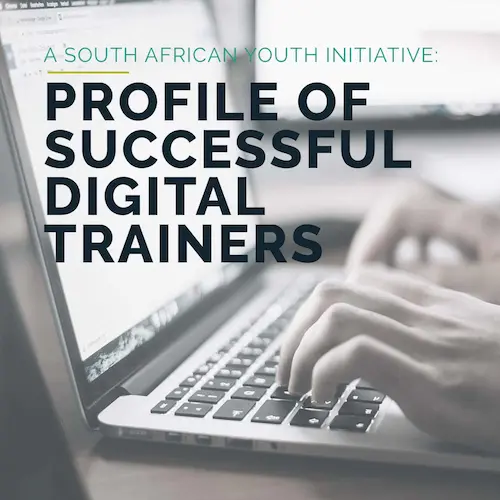Challenge
South Africa has one of the highest rates of youth unemployment in the world, which consequently leads to negative social and economic effects. To mitigate some of the dire outcomes of youth unemployment, the implementation of long-term, sustainable interventions and initiatives are therefore necessary. Through a collaborative initiative, a pilot study that created multiple micro digital enterprises for South African youth was conducted. Unemployed youth in South Africa were contracted as micro digital trainers to educate residents how to connect to free Wi-Fi hotspots to utilise online services. The candidates(with a minimum matric certificate) were trained, equipped with tablets, supported through mentors, and monitored online in order to enable invoicing against validated services.The digital trainers’ performance in the programme was based on the number of residents they successfully trained during their 12-week opportunity agreement. At the end of their contract period they completed a battery of psychometric assessments.
The main aim of these assessments was to profile successful digital trainers in the programme in order to inform the selection of digital knowledge workers in other programmes where unemployed youth are contracted for service delivery.
Solution/Study
JvR Psychometrics developed a profile of successful South African youth able to startup a micro digital enterprise. The profile was developed according to personality characteristics (Basic Traits Inventory, BTI), verbal and numerical abilities (Verbatim and Numeratum), detail-orientation and work styles (Prospect Screener), as well as the candidate’s performance in the programme. In total, 474 South African digital trainers, with an average age of 24years, took part in this study, with the majority being Black (97.5%), Zulu speaking (29.9%) women (61.0%). Each digital trainer successfully trained an average of 281 South African residents over the 12-week project period. Results from the BTI indicate that the digital trainers are able to organise and carry out tasks in an effective manner, while remaining fairly emotionally stable in the completion of tasks. The majority (97.3%) of digital trainers met the minimum numerical, verbal, detail checking, work styles, and overall requirements from the Prospect Screener. From the Verbatim and Numeratum, the digital trainers were found to be minimally proficient in understanding and reading basic English and having basic number skills.
Application
From the results,a profile of successful young digital trainersemerged. Based on these results, the following characteristics should be consideredwhen unemployed youth are contracted for community-based service delivery. Candidates should be:
able to get along with other people;
willing to take risks;
methodical and organised;
concerned for their community and helping others;
attentive to details and small changes in their environment; and
goodatverbal reasoning ability.
Share this post
Newsletter
Get up-to-date industry news right in your inbox



